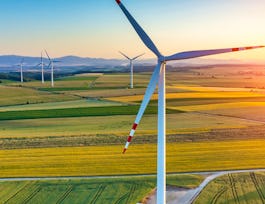The Global Energy and Climate Policy course offers an introduction to the theoretical and practical understanding of how energy and climate change policies are designed, shaped, advocated and implemented. As energy markets go truly global, domestic energy policies are becoming more and more entangled with wider issues of international governance. Concurrently, the urgent need to mitigate and adapt to climate change and transition to a low-carbon future is adding a further layer of complexity.



Global Energy and Climate Policy


Instructors: Harald Heubaum
Sponsored by Syrian Youth Assembly
36,297 already enrolled
(670 reviews)
Details to know

Add to your LinkedIn profile
See how employees at top companies are mastering in-demand skills


Earn a career certificate
Add this credential to your LinkedIn profile, resume, or CV
Share it on social media and in your performance review

There are 6 modules in this course
This week introduces the concept of a carbon-constrained world, considering how it links to energy policies and the future of fossil fuels. It will also discuss the role of technologies such as carbon capture and storage (CCS) and how different stakeholders, in developed and developing countries, perceive the need to decarbonize energy systems.
What's included
6 videos3 readings1 peer review1 discussion prompt
This week introduces the competing cases on economic, environmental and political aspects of nuclear power as part of the global energy mix and its role in meeting both energy security and climate change mitigation needs.
What's included
3 videos1 reading1 peer review1 discussion prompt
This week discusses the growing role of renewable energy sources such as wind and solar. It introduces the range of fiscal and other policy tools that governments’ use to promote an increase in the production and consumption of renewable energy.
What's included
3 videos1 reading1 peer review
This week addresses how energy and climate governance are becoming more inter-related. Climate change is a global collective action problem whereas energy is more often associated with state based priorities. However, emissions from fossil fuel energy have global impacts and pose a challenge to the international community at-large.
What's included
2 videos1 reading1 peer review
This week provides an introduction to the various conceptualisations of energy security and considers the implications these can have on energy and climate change strategies.
What's included
3 videos1 reading1 peer review
For the week 6 optional exercise, you may draw upon your learning from previous weeks to understand how climate change is changing the focus of energy policy. Specifically, you are asked to consider this in light of the 2015 Paris Agreement on climate change.
What's included
4 videos1 reading1 peer review
Instructors


Why people choose Coursera for their career




Learner reviews
670 reviews
- 5 stars
75.55%
- 4 stars
17.73%
- 3 stars
4.17%
- 2 stars
1.19%
- 1 star
1.34%
Showing 3 of 670
Reviewed on Mar 11, 2021
The weekly sessions were very informatiive and provided a well-balanced assessments of all the issues facing our planet with regards to energy, security and climate change.
Reviewed on Nov 4, 2020
This course is truly helpful for those who would like to learn more about energy and climate policy. I appreciate how the modules and topics were presented in a form of various interview.
Reviewed on Jan 30, 2023
Excellent short course providing linkages between energy and climate policy. It delves into the future energy sources prospects in this carbon constrained world.
Recommended if you're interested in Social Sciences

EDHEC Business School

University of Pennsylvania

University of Alberta

ESSEC Business School

Open new doors with Coursera Plus
Unlimited access to 10,000+ world-class courses, hands-on projects, and job-ready certificate programs - all included in your subscription
Advance your career with an online degree
Earn a degree from world-class universities - 100% online
Join over 3,400 global companies that choose Coursera for Business
Upskill your employees to excel in the digital economy




